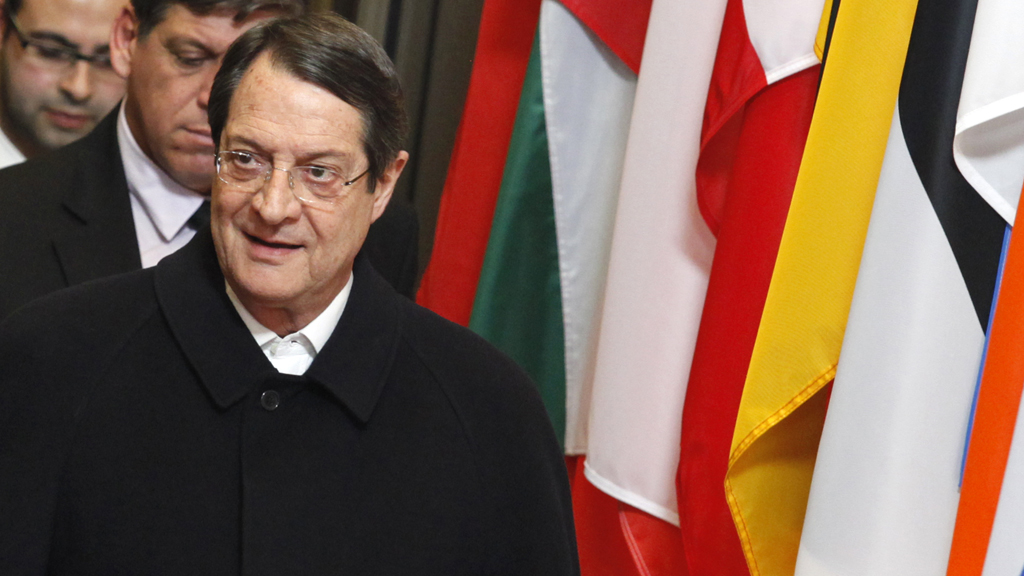Cyprus secures last minute bailout deal, but at what cost?
Cyprus secures a last-minute, 10bn euro bailout in a deal which will see its second largest bank closed and those with the largest deposits facing a levy to raise funds.
The agreement last night, following meetings between Cyprus’s political leaders and representatives of the ‘troika’– the European Union, the European Central Bank and the International Monetary Fund – came hours before a deadline on negotiations.
We averted a disorderly bankruptcy which would have led to an exit of Cyprus from the euro zone with unforeseeable consequences – Cyprus government spokesman
Under the deal the largely state-owned Popular Bank of Cyprus, also known as Laiki, will be wound down, with deposits in the bank below 100,000 euros being shifted to Bank of Cyprus to create a “good bank”.
Deposits in both banks above 100,000 euros, including those belonging to wealthy Russians using the Mediterranean island as an offshore haven, will be frozen, and used to raise 4.2bn euros – which will be used to pay off Laiki’s debts and recapitalise Bank of Cyprus through a deposit/equity conversion.
Most Cypriot banks will re-open tomorrow, but branches of Popular and Bank of Cyprus will remain closed until Thursday.
Russian Prime Minister Dmitry Medvedev was quoted as telling a meeting of government officials: “In my view, the stealing of what has already been stolen continues.”

It has been estimated that depositors will lose around 30 per cent.
‘Averted bankruptcy’
The closure of Laiki will lead to thousands of job losses. Officials said senior bondholders in Laiki would be wiped out and those in Bank of Cyprus would have to make a contribution.
Cyprus government spokesman Christos Stylianides said: “We averted a disorderly bankruptcy which would have led to an exit of Cyprus from the euro zone with unforeseeable consequences.”
And Angela Merkel, reviled by many protestors in Cyprus as a figureheaqd of the austerity they argued was being imposed on them, also welcomed the deal.
“I am very pleased that a solution was found last night and that we have been able to avoid an insolvency,” she said. “I believe the agreement that was reached is the right one.”

The deal will not need the backing of Cypriot politicians. Last week, an initial attempt at a bailout deal collapsed when politicians voted against a levy on all deposits.
Behind closed doors it is understood that troika leaders would not back down on a levy hitting the biggest deposit holders. A senior source involved in the discussions said Cypriot leader President Nicos Anastasiades had threatened to resign on Sunday if pushed too far.
He left the EU headquarters in Brussels without making any comment.
Following the deal, Russian president Vladimir Putin instructed his government to negotiate new terms for a Russian loan to Cyprus, his spokesman Dmitry Peskov said.
Cyprus had requested an extension of an existing 2.5 bn euros Russian loan, and a reduction in the interest it charges to 2.5 percent from 4.5 percent, but talks last week failed to find an agreement.
However, in a move that suggests Moscow supports the EU bailout deal, Putin requested political heads return to the negotiating table.
The move from Russia will be welcome, especially in light of the fact that many Russian depositors face being hit by the levy on bank deposits.
‘Credible plan’
IMF chief Christine Lagarde said the agreement was “a comprehensive and credible plan” that addresses the core problem of the banking system.
“This agreement provides the basis for restoring trust in the banking system, which is key to supporting growth,” she said in a statement.
On Sunday, around 200 bank employees protested outside the Cypriot presidential palace chanting “Cyprus will not become a protectorate”. There have been other similar protests outside banks in Cyprus (see picture, above).
With banks closed for the last week, the Central Bank of Cyprus imposed a 100 euros daily limit on withdrawals from cash machines at the two biggest banks to avert a run.
‘No alternative’
British Prime Minister David Cameron said the financial difficulties Cyprus has faced are a “reminder” that there is “no alternative” another than the government’s course on securing the UK’s own financial future.
“It is good that an agreement has been reached overnight and I think that is welcome for people in Cyprus,” Mr Cameron said. “I think the first proposals of taxing people with bank accounts under 100,000 euros was a complete mistake and I am glad that has been avoided.
“I think, from Britain’s point of view, the situation in Cyprus is a reminder of a couple of important home truths.
“The first is it was right not to join the euro, we are better off outside the euro. We can have our own economic policy, our own monetary policy and mend our fragile economy, which is badly in need of mending.
“But I think the second lesson is that while it is very difficult, there isn’t an alternative to getting on top of our deficit, to getting our public spending under control, to making our economy more prone to growth.
“Those difficult steps the government’s taking, there is no alternative to that.”